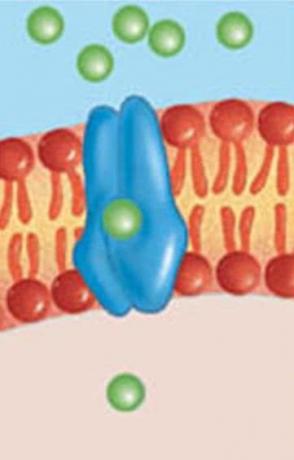Facilitated diffusion is a type of passive transport of substances across the cell membrane, which relies on the help of proteins.
Occurs without ATP expense.
Cell membranes are dynamic, fluid structures made up of a lipid bilayer. They control the entry and exit of substances from the cell.
They allow the entry of water, oxygen gas, food and promote the exit of carbon dioxide and excreta.
Passage of substances through the Membrane
Substances can cross the membrane in two ways:
Passive Transport: No ATP expense.
The solute flux follows its concentration gradient, from the most concentrated to the least concentrated. That is, in favor of the concentration gradient.
Example: Simple Diffusion, Osmosis and Facilitated Diffusion
Active Transport: With ATP spending.
The flux of solute across the plasma membrane is against the concentration gradient.
Example: Sodium and Potassium Pump.
Learn more about Active Transport.
The Facilitated Dissemination Mechanism
Facilitated diffusion is the passage through the membrane of substances that do not dissolve in lipids, aided by the proteins that permeate the lipid bilayer. Occurs
no ATP expense.These proteins are called Permeases, which act as a carrier of substances.
Permeses capture molecules and facilitate their entry into the cell. Hence the name Facilitated Diffusion.
 The cell membrane and the presence of a permease performing facilitated diffusion
The cell membrane and the presence of a permease performing facilitated diffusion
By simple diffusion, the substances would take a long time to cross the cell membrane and equalize their concentrations.
Facilitated diffusion is used to transport substances that, despite following its concentration gradient, are naturally impermeable to the membrane.
In human cells there is an abundance of glucose transporting permeases.
Learn more about Selective Permeability of the Plasma Membrane.
Facilitated Diffusion and Osmosis
THE osmosis it is a particular type of diffusion, in which the constituent of the solution that diffuses is water.
Osmosis and facilitated diffusion are considered passive transport, in which no energy is wasted.
Both occur in favor of a concentration gradient, that is, from the more concentrated to the less concentrated medium.
Simple Diffusion and Facilitated Diffusion
THE simple diffusion it occurs due to the natural tendency of molecules or ions to disperse in the available environment. However, in simple diffusion there is no help of permeases, as in facilitated diffusion.
The two forms of diffusion are considered passive transport.

